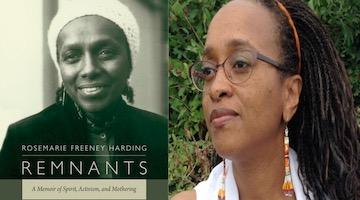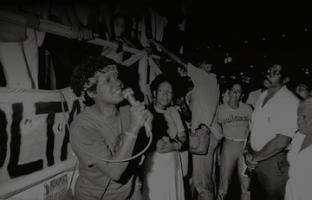“American gynecology and obstetrics is intimately bound to American slavery.”
In this series, we ask acclaimed authors to answer five questions about their book. This week’s featured author is Deirdre Cooper Owens. Owens is an Associate Professor of History at Queens College, CUNY. Her book is Medical Bondage: Race, Gender, and the Origins of American Gynecology.
How can your book help BAR readers understand the current political and social climate?
Medical Bondageprovides context for controversial issues that focus on historical memory, past historical actors whose lives and worked went unchallenged for centuries and who often received uncritical praise from their symbolic descendants. Also, my book demonstrates how the legacy of medical racism from the late 18thand 19thcenturies continues to affect black women’s lives in detrimental ways, especially maternally.
For instance, the activism of Black and Latina/x women in New York around the removal of the James Marion Sims statue in Central Park was also linked to their outrage that enslaved women’s lives, experiences, and their labor was not included in the memorialization of Sims as the lauded “Father of American Gynecology.” As a historian, my scholarship on not only Sims but also, the 19thcentury American medical landscape shows how instrumental slavery, and to a large degree black women’s free labor, was to the advancement of modern American gynecology. From the caesarian section to the surgical removal of diseased ovaries to the improvement of the speculum, American gynecology and obstetrics is intimately bound to American slavery. Black women’s bodies helped to birth the field and until relatively recently, their sufferings had not been acknowledged in the historical record.
What do you hope activists and community organizers will take away from reading your book?
My hope is that activists and community organizers will have a better sense of American medical history and understand the context of slavery, medicine, antebellum-era racism, and anxieties around white manhood and masculinity. Once they read the book, I am hopeful that they will see that James Marion Sims was not exceptional in his treatment of enslaved women and even the poor Irish-immigrant women he worked on in the 1840s and 1850s. He was simply following a practice that had already been established for him by his European and early American forefathers who used women of African descent in identical ways (from their writings to their beliefs about black biological difference and inferiority). I am hopeful that activists and community organizers will have even more precise and accurate information about this country’s medical history and racism and be able to demand, with more evidence, that the systemic mistreatment of black medical patients stop immediately. I would love for medical professionals to take the complaints of activists and organizers more seriously, especially those charged with caring for and treating black and poor people in sites of healing.
We know readers will learn a lot from your book, but what do you hope readers will un-learn? In other words, is there a particular ideology you’re hoping to dismantle?
Yes, I would like readers to know that slave-holding physicians were not interested in butchering the reproductive organs of enslaved women. Those men were as thoroughly invested in maintaining the institution of slavery as they were in maintaining black enslaved women’s fertility so that slavery would continue to flourish. American slavery was preserved and thrived when enslaved women gave birth to their babies, new slaves.The paternity of the enslaved children did not matter in a slave-holding society because owned black women’s children inherited their slave status from their mothers. For instance, American presidents could impregnate black women they owned and the babies born from these sexual encounters would not be able to lay claim to anything remotely related to their white parent or his free status. Thus early pioneering gynecologists would not benefit from making their slave patients sterile both professionally and personally.
Who are the intellectual heroes that inspire your work?
Scholars of slavery like Deborah Gray White, Jennifer Morgan, and the late Stephanie Camp inspire me. Emerging scholars of the Caribbean world and slavery like Sasha Turner, Natasha Lightfoot, and Marisa Fuentes are absolutely brilliant. I am in awe of the brilliant fictive writing of Toni Morrison and am inspired always by early pioneer black intellectuals like the late James Cone, John Hope Franklin, and W.E.B. Du Bois. I also love the confident brilliance of everyday black women who thrive in spite of all the negative tropes about their womanhood, race, and humanity. Each day I see black women working, slaying, learning, being vulnerable, angry, and living, I am inspired. Lastly, the more I learn about Harriet Tubman’s genius, I strive to be more well-rounded like her and to trust my intuitive intelligence as she did when she lived and was transforming lives.
In what way does your book help us imagine new worlds?
I am not sure if my book helps readers to imagine a new world. I think what it does is reconnect us to the fact that this country, and more specifically the western world, is deeply intertwined with slavery and black people’s oppression and labor. There is barely an industry that emerged in colonial America and later the United States that is not stained with the blood of slavery. Black people’s labor, and in my book I focus on women, was so intimately tied to their bodies that European colonists and then the so-called early founders of this country began to change laws that would continue to commoditize black women’s bodies for profit. When one makes wet nursing or breast-feeding, a biological function of birthing children, a labor category that made money for white men and their families (and healthiness for their babies), we can see what motivated early white Americans to keep black people subjugated. Black lives mattered during the era of slavery for white Americans collectively because owned black lives represented wealth. In the age of freedom, black people were transformed from objects of wealth to objects of financial burden and so the economically valuable reproductive mother of slavery becomes the so-called “welfare queen” and disreputable “baby mama” of the 20thand 21stcenturies. Medical Bondageis less about the imagining of something new, it is a mirror that reflects the United States’ history for good or naught and we must all reckon with the implications of this past.
Roberto Sirvent is Professor of Political and Social Ethics at Hope International University in Fullerton, CA. He also serves as the Outreach and Mentoring Coordinator for the Political Theology Network. He’s currently writing a book with fellow BAR contributor Danny Haiphong called American Exceptionalism and American Innocence: The Fake News of U.S. Empire.



















